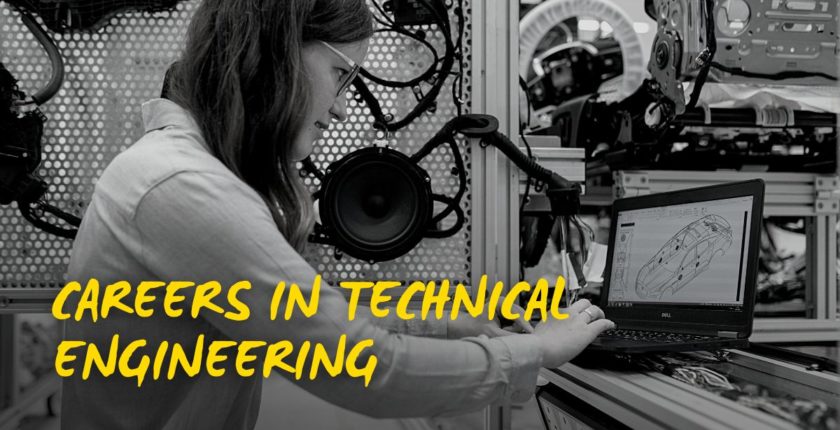Careers in Technical Engineering
Want to find out a bit more about the different careers in Technical Engineering? Well, look no further, as this blog article will be covering the types of careers available. But first, let’s look at what the general role of a Technical Engineer is:
A Technical Engineers role is supporting Engineers with projects, such as design, construction, maintenance, installation, troubleshooting, and report writing. They must analyse projects to find technical issues and solve them.
Careers in Applications Engineering
As an Applications Engineer, your key responsibility is to train employees on how to use the machinery. You will do this by going through the product training to ensure operators know how to use machines correctly. You will also oversee the installation of machinery and other equipment, ensuring it is able to complete the necessary functions. If machinery isn’t functioning as expected, you’ll be required to make changes to it and establish a maintenance routine.
How much does an Applications Engineer earn?
Typically, entry-level positions start at around £28,000 per year while more experienced senior-level positions make up to £56,000 per year. But it’s difficult to say for sure what you’ll earn, as it will vary depending on the company.
How to progress as an Applications Engineer?
Working as an Applications Engineer can lead you down a number of different paths. From our experience, we find that many individuals go down the Sales Engineering route or the Project Management route due to the frequent face-to-face contact with customers. On average, it should take around 5 years working as an Applications Engineer to go down either of these paths.
What qualifications and skills do you need to work as an Applications Engineer?
You must have time-served in order to be qualified as an Applications Engineer, and some employers may require an NVQ level 3 qualification, while others may only demand a level 2. To be able to use machine tooling for cutting, drilling, shaping, and finishing products or components for the engineering and manufacturing sectors, you must possess a CNC certification.
Back to the contents or keep scrolling to read more!
Careers in Design Engineering
If you are interested in working as a Design Engineer, you will be involved in the initial concept, design and development of projects, and then seek opportunities to implement these new projects. You should have a strong understanding of how to use computer-aided design (CAD) software, a tool used for creating designs. There are many other responsibilities that you may have as a Design Engineer, such as ensuring all components are functioning and analysing data to improve projects
Design Engineers are also known as CAD engineers, Consulting Engineers, & Product Design Engineers.
How much does a Design Engineer earn?
The salary range will depend on how much expertise you have, and different companies will offer different salaries, so it’s hard to estimate a perfect salary average. But generally, entry-level jobs typically start at around £30,000 per year, whereas senior-level jobs with more expertise can earn up to about £45,000 per year.
How to progress as a Design Engineer?
You will typically start your Design Engineering career as a CAD Engineer, but in terms of progression, you’ll first work with 2D design and then start using 3D design, which will then qualify you as a Design Engineer. In terms of the career path, you may want to look into becoming a Design Manager or a Senior Design Engineer, which, on average, will take you around 7-10 years working as a Design Engineer to progress into either of these roles.
What qualifications and skills do you need to work as a Design Engineer?
If you are interested in becoming a Design Engineer, you must have a few years of experience, and some employers will accept candidates with an NVQ level 3 qualification, whereas others may prefer candidates with a Bachelor of Science in Engineering.
Having a strong understanding of CAD software to improve the company’s technological infrastructure is also necessary.
Back to the contents or keep scrolling to read more!
Careers in Production Engineering
Your primary duties as a Production Engineer are to optimise production processes by training employees on how to operate machinery and equipment, troubleshooting, and implementing plans to maximize production efficiencies. Production Engineers support the speed and efficiency of production, helping it to run smoothly.
How much does a Production Engineer earn?
Entry-level positions tend to start at approximately £30,000 per year, whereas those working in more senior roles can make up to £45,000 per year, but some employers may offer more than this, so it can be difficult to give an estimate on how much you will make.
How to progress as a Production Engineer?
This is one of the easier careers in Technical Engineering to get into, where Production Engineers can start off with an entry-level role and work their way through. You may find that you enjoy the production side, so your main career path aim would be to become a Production Manager, which will take about 10 to 15 years working your way up from the junior level role.
What qualifications and skills do you need to work as a Production Engineer?
As we’ve already mentioned, becoming a Production Engineer is much simpler because typically you just need experience, which you can gain by starting off in an entry role and working your way up.
It’s important that you can work well in a team, communicate effectively, and make decisions under time constraints, but these are just a few of the essential skills needed for the many roles in Production Engineering.
Back to the contents or keep scrolling to read more!
Careers in Health and Safety
There are many roles available in Health and Safety, such as a Health and Safety Engineer, and they place a strong emphasis on safeguarding employees and their well-being. As a Health and Safety Engineer, a few of the responsibilities you have are devising safety policies, training staff on the H&S procedures, monitoring these procedures to ensure compliance, as well as responding to workplace accidents.
One of the most important aspects of careers in Health and Safety nowadays is your ability to minimize the impact a company has on the environment, which can provide a competitive advantage and attract new customers or hires that want to work with ethical manufacturers.
How much do Health and Safety Engineers earn?
The salary of a Health and Safety Engineer will depend on how much experience you have, but generally, at entry level with less than 1 year of experience, you will make around £27,000. If you have a bit more experience, around 10-15 years, you can earn up to around £51,000
How to progress as a Health and Safety Engineer?
In order to become a Health and Safety Engineer, you will need to have a Health and Safety qualification before joining the company. In terms of the career path for a Health and Safety Engineer, you would then progress to become a Health and Safety Manager, which will require further qualifications but will overall take around 10 years to advance to this role.
What qualifications and skills do you need to work as a Health and Safety Engineer?
For this career in Technical Engineering, most employers will require you to have an Engineering degree, but some employers may not deem this as essential, and it may just be preferred. However, it’s often essential to have a NEBOSH or IOSH certification, as well as having experience in a previous Health and Safety job, or within a similar role.
Strong communication and negotiating skills are necessary for Health and Safety Engineers so that you’re able to explain safety procedures to employees and persuade managers to adopt procedures. Because this profession requires a collaborative approach, your interpersonal skills are also very important, which refers to being able to deal with people sensitively.
Back to the contents or keep scrolling to read more!
Careers in Quality Engineering
Nowadays, it’s important for businesses to listen to customers to ensure they are providing high-quality products and services. Quality Engineers, also known as Quality Control Engineers, work closely with Production Engineers to ensure products meet customer standards and identify ways to continually improve the product or service. If done correctly, roles in quality can have an enormous impact on a company’s bottom line.
How much do Quality Engineers earn?
It’s challenging to determine an average salary because it will depend on your level of expertise and the salaries that various companies offer. Entry-level positions typically start at around £32,000 per year, whereas individuals with more experience in a senior role can earn up to about £50,000 per year.
How to progress as a Quality Engineer?
If you enjoy being in an office-based role, you can advance to a Supply and Development Quality Engineer where you will lease with suppliers to understand the quality they require. Alternatively, if you enjoy being in a shopfloor-based role, you can progress to a Quality Manager, where you will manage all Quality Engineers. Generally, it takes around 5 to 7 years of progression to become a Supply and Development Quality Engineer, whereas it will take approximately 10 years to progress into a Quality Manager position.
What qualifications and skills do you need to work as a Quality Engineer?
If you are interested in a career in Quality Engineering, most employers will expect you to possess a Higher National Certificate (HNC) or Higher National Diploma (HND), which is equivalent to an NVQ level 4 and level 5. If you chose the academic route instead, a degree in engineering is also acceptable.
To be able to solve the day-to-day quality issues that come with this position, you’ll need to be able to communicate well and have high analytical skills, and it will also be crucial to have strong computer literacy skills.
Back to the contents or keep scrolling to read more!
Careers in Service and Installation Engineering
Within Service and Installation roles, it’s all about installing, maintaining and upgrading machinery. As a Service or Installation Engineer, you will find that you have a variety of responsibilities, ranging from product assembly and repair to the maintenance of existing machinery and equipment. The ability to solve issues in these roles, therefore, requires you to have a strong understanding of mechanical and electrical processes.
How much do Service and Installation Engineers earn?
Entry-level salaries typically start at around £27,500 per year, while more seasoned senior-level positions can earn up to about £40,000 per year. But, because your pay will vary depending on the company, it’s difficult to say with certainty what you’ll make.
How to progress as a Service and Installation Engineer?
As a Service or Installation Engineer, there are a few career progression routes you can take, such as a Service Manager, where you manage the Service Engineers and Installation Engineers.
You can advance to a Project Manager position after gaining around 15 years of hands-on experience installing machines on shop floors. In this role, you will oversee projects where machinery is installed and ensure that the machinery is installed correctly by understanding the project’s requirements.
What qualifications and skills do you need to work as a Service and Installation Engineer?
To work as a Service Engineer or Installation Engineer, you must have GCSEs at the very least, but many firms may require an NVQ level 3 or equivalent. If you want to stand out from other candidates, becoming CSCS or IPAF qualified will be useful, or it may be a requirement. Although training is available, you can start this career with no experience needed if you have the right qualifications and ability to follow instructions and use tools correctly. Yet this is not always the case! Some employers may request you have prior experience working in a similar role.
Along with these qualifications, if you have an eye for detail and organisation, this career in Technical Engineering is ideal! These skills will assist you in managing your workload as a Quality Engineer. Additionally, the work involved can be physically demanding, so it’s important to keep your body in a good condition to complete the tasks necessary for the job.
Back to the contents or keep scrolling to read more!
How are careers in Technical Engineering going to change in the future?
We asked our Senior Recruitment Consultant, Natasha Bates, where she thinks careers in Technical Engineering will go in the future!

“In my opinion, I think we are going to see a lot of change in the next 10 to 15 years. I think a lot of the manufacturing and engineering shopfloors are going to go toward the automation side of things. There will be a lot of robots installed, so less people on shopfloors, especially on the production side”
In Summary
Whether you have lots of prior engineering experience, or you have only recently graduated from university, there are various careers in Technical Engineering that you can choose from. Many of the careers we have spoken about will require either an NVQ or a degree, but there are positions where you can start at entry-level and work your way up. The engineers that stand out from the crowd in this sector will often possess a certification specific to the role, so be sure to check out our qualifications sections that talks more about this!
Ultimately, careers in Technical Engineering will have different employment criteria depending on the company, but engineers that are successful within this sector will have the necessary skills and dedication to the job. If you consider yourself an adaptable, hardworking individual that wants to help a company progress, then you will get the most out of these careers, and be able to advance in your career successfully.

